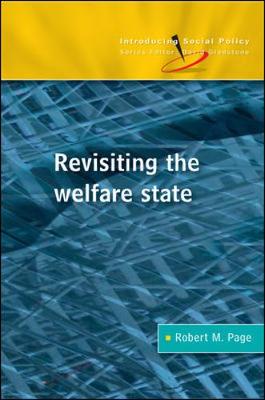In Revisiting the Welfare State, Robert Page provides a persuasive, fresh and challenging account of the British welfare state since 1940. His text re-examines some of the most commonly held assumptions about the post-war welfare state and reignites the debate about its role and purpose.
- What was the impact of the Second World War on the development of the welfare state?
- Did Attlee’s pioneering post-war Labour governments create the welfare state and a socialist society?
- Was there a welfare consensus between Labour and the Conservatives in the period from 1951 to 1979?
- Was there a welfare revolution during the Thatcher and Major years?
- What lies at the heart of New Labour’s welfare policy?
Robert Page starts from the premise that the student of social policy can gain a deeper understanding of the welfare state by studying political and historical accounts of the welfare state, party manifestos, policy documents and political memoirs. Drawing from these sources, he provides a clear guide to the changing role of the state in the provision of welfare since 1940. Each of the five chapters is devoted to a particular theme associated with the post-war welfare state, the last of which focuses on the strategy of the New Labour governments of Tony Blair.
Written by one of the leading authorities on contemporary social policy, Revisiting the Welfare State is a stimulating guide to the political history of the post-war welfare state in Britain. It is essential reading for students of social policy, social work, politics and contemporary history. It will also appeal to the general reader who is seeking an accessible guide to the political history of the post-war welfare state.
- ISBN13 9780335213184
- Publish Date 16 October 2007 (first published 1 January 2007)
- Publish Status Out of Print
- Out of Print 9 July 2012
- Publish Country GB
- Imprint Open University Press
- Format Hardcover
- Pages 176
- Language English
